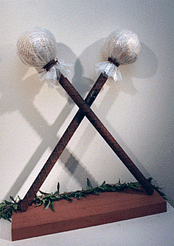Kapu

"Kapu refers to the ancient Hawaiian code of conduct of laws and regulations." The kapu system was used in lifestyle, gender roles, politics, and religion. The Kapu was connected to government power and religious power. Breaking one, even unintentionally, usually meant death.The Kapu was connected to government power and religious power. Breaking one, even unintentionally, usually meant death. The Hawaiian word 'kapu' is translated to English as "forbidden", though it also means "sacred". There were many different laws of Kapu.
Kapuhili
Most famous law was the Kapuhili restriction, a law involving the contact with chiefs , but these also apply to all people of known spiritual power. Kapu Kū mamao means prohibited from a place of the chief. Kapu noho was to assemble before the chief. You weren't allowed to come in contact with the chiefs hair or fingernail clippings, to look directly at him, and to be in sight of him with a head higher than his. Wearing red and yellow feathers was not allowed, unless an individual was a high rank. Places that where you couldn't go were are shown by Pahu Kapu, two crossed staffs with a white ball on top.
Ai Kapu
The ʻAi kapu was the kapu system's law over contact between men and women. "Many aliʻi obtained their power through this system, and then would give thanks to the god of politics Ku." ʻAi means to eat and Kapu means sacred. This law is based on a legend about the sky god. Wākea, wanted to sleep with his daughter, Ho ʻohokulani. The law was made so he could go see her without his wife being suspicious. This law stated that men and women could not eat together. Some foods were illegal for women to eat: pork, bananas, taro, and coconuts because they were all foods representing the gods. Women also couldn't eat some large fish. The kapu system was used in Hawaii until 1819, when King Kamehameha II, acting with his mother Keopuolani and his father's queen Ka'ahumanu, abolished it after defeating Europe and eating with women of the court. Abolishing the ʻai kapu gave more power to Kamehameha and his successors because it meant people in the lower ranks had less power. This political system gave the other rulers rank, power, and prestige.
Aloha Aina
"Kapu" restrictions were used to regulate Hawaiian fishing in order to maintain the long-term viability of ocean life in the 1700s and 1800s." Some fish and designated areas were forbidden during times when overfishing could damage the environment. This relates to modern day, because we have hunting seasons which give the animals a chance to repopulate.
